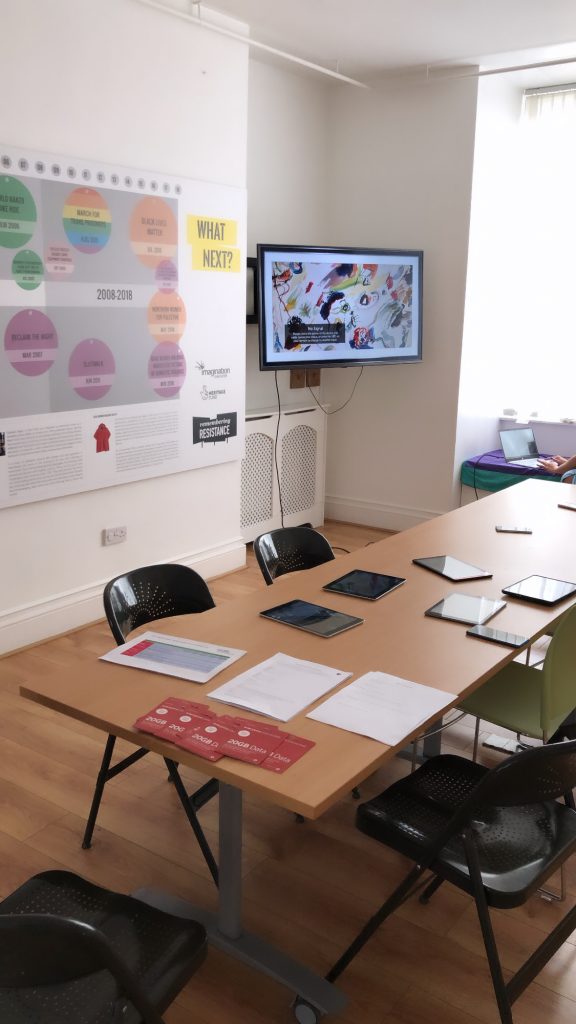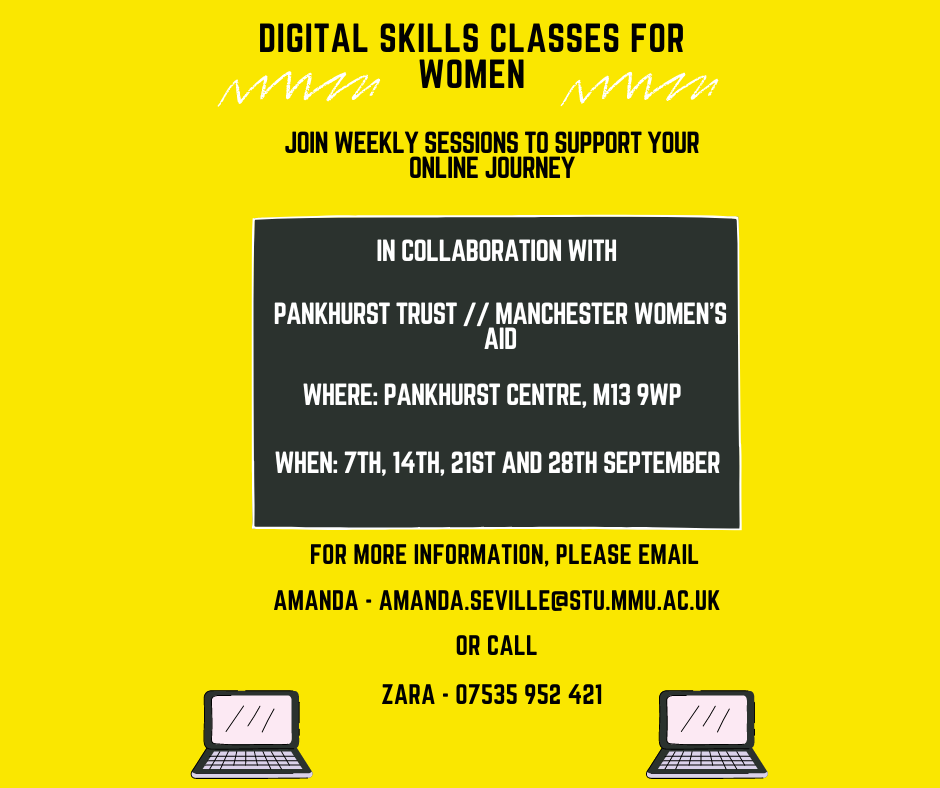In the month of September, our Manchester Digital Collective partnered with the Pankhurst Centre and Amanda Seville, PhD Researcher on Women’s Homelessness and Barriers to Support, to host a series of female-focused digital skills workshops. As this series comes to an end we spoke to Amanda and the MDC team to learn more about what the workshops accomplish and how important it is to build digital skills.
Amanda’s research was one of the main drivers for the collaborative workshops so we asked her how she identified the need.
“One of the aims of the Leverhulme Trust Scholarship who fund my PhD is to create a project which is interdisciplinary. My research combines sociology, technology and mapping practices. I wanted to explore the many barriers that homeless women face when accessing support and how these can be overcome by co-designing a digital tool which signposts women-only services in Manchester. This will involve mapping support services in the city and using participatory methods to create the signposting app. However, before discussing the creation of a digital tool with participants, I realised the importance of improving digital inclusion amongst women so they can benefit from the use of their devices. I began volunteering at a computer class at a different homeless organisation earlier this year, and I noticed the importance for users to learn basic digital skills, from sending emails to using search engines to look for information. Many people who attended the classes lacked basic digital skills and as my research gives priority to gender, I wanted to run my own digital sessions for women.”
As part of the MDC, we endeavour to run digital skills workshops in collaboration with a range of organisations to reach those who require support. When Amanda mentioned she was planning to run sessions at the Pankhurst, we asked if she would be interested in a collaboration.
While most of our outreach so far has been focused on homeless prevention centres and with students, this was a great opportunity for us to support a new group of people. We see more and more that digital skills are universally needed and we want to continue to expand the groups we are able to support.
What the workshops look like
The sessions started with asking women to complete an assessment form regarding their digital skills. This is then discussed on a 1-1 basis to ensure the support given was specific to the women’s needs. Often this illustrated a lack of basic digital skills when it comes to using their smartphones, so sessions began with a walkthrough of the 5 basic digital skills – managing info, communication, transacting, problem-solving and creating.
Throughout the month, the sessions were user-led with women coming to the organisers asking to support them with a specific topic or skill. This way, they focus on individuals’ needs and requirements. Overall the sessions were quite informal and thanks to the volunteers, 1-1 support was available for all of our participants. The sessions helped to build digital skills including creating an email account, downloading apps such as NHS, saving documents to their phones and creating social media accounts.

Feedback from Participants
The women who participated remarked how useful the sessions were and how they were able to learn so much in such a short space of time (2 hours). They said the sessions were definitely needed and they were appreciative of the 1-1 support available to help them tackle specific skills gaps they had.
Feedback from Volunteers and Organisers
Zara, Digital Inclusion Coordinator for the MDC reported “Seeing the women benefit from the sessions has been rewarding. We’ve been able to support women to create email addresses (allowing them the freedom to send their own documents without support from others), use social media (to build relationships and networks of people that can support them) and use programmes to support their learning and development. Having an open, welcoming and safe space allowed us to foster an environment filled with trust and curiosity; seeing attendees leave the session having learnt a new skill was amazing.“
Amanda, MMU, added, “I think seeing the women benefit from these sessions has been really rewarding and I underestimated how many women from different backgrounds and of different ages lack the basic digital skills that many of us take for granted. During one session two women attended who both wanted advice on downloading and using a voice recording app. They had both been advised to record interactions with their abusive ex-partners. Not only was it useful to show the women how to use these apps, but I think it also helped them to discuss their issues and hear from other attendees that they are not the only ones who are going through some form of domestic abuse or homelessness. They were both able to use a voice recording app (by the end of the sessions.)
In addition to this for some of the women who attended the sessions, English was not their first language so they struggled to understand written or spoken instructions. Therefore, it was useful to show them how to download and use translation apps which will give them independence when accessing other support services, such as making a GP appointment or completing an application form”
Moving Forward
In this sector, collaboration is key. It allows you to have a wider reach and in turn, help more people. The Pankhurst Centre allowed the MDC an opportunity to support more marginalised groups of people by teaching them digital skills and Amanda brought her experience of working with marginalised groups, particularly women, in her previous research and her current role as a support worker. This allowed the build-up of strong relationships with attendees. The experience was great and we are pleased to announce that this workshop series will continue as a monthly occurrence at the Pankhurst Centre.
Amanda is now seeking the voluntary participation of women experiencing ‘hidden’ homelessness to participate in further research which has been formally approved by MMU’s Ethics Committee. Participation will include a 1-1 interview with Amanda and a number of focus groups to discuss women’s experiences of ‘hidden’ homelessness (living in temporary accommodation), the stigma participants may face, and the use of digital devices as a way of improving access to women- only support centres in Manchester. For more information, you can contact her on Twitter.
The MDC is also beginning drop-in digital skills sessions in the month of November. To find out more about the workshop timings you can follow the MDC on Facebook.

